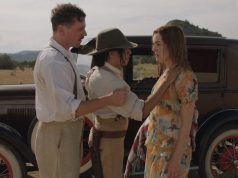The wealthy people of Berlin are being terrorized by a group known as The Edukators. These people break into nice homes and, stealing nothing, rearrange the furniture, stacking the chairs, putting the stereo in the refrigerator, that sort of thing. They leave an ominous note behind: “Your days of plenty are numbered.” (It’s even more ominous when it’s in German, though I suppose that’s true of most things.)
It’s a war between the idealistic young people and the conservative rich folks, a battle that has been fought for as long as there has been capitalism. In “The Edukators,” a sublimely funny, surprisingly warm-hearted little story from German writer/director Hans Weingartner, the youthful econo-terrorists are just two guys, Jan (Daniel Brühl) and Peter (Stipe Erceg). Jan feels it deeply, a constant scowl on his face as he observes the injustice and unfairness in the world. Peter just enjoys breaking into people’s houses and causing trouble. They live a bohemian lifestyle in a shabby apartment, where they are soon joined by Peter’s waitress girlfriend Jule (Julia Jentsch), recently evicted from her own crap-hole flat.
While Peter is in Barcelona following up on a job lead, Jan and Jule hang out, getting past that awkward “friends-in-law” stage — what do they have to talk about besides Peter? — by painting her old apartment (necessary to get the deposit back). Then Jan lets her in on his and Peter’s nocturnal activities, taking her on an Edukators mission against what is surely his better judgment.
Jule has a perfect candidate in mind. A year ago, she rear-ended a Mercedes and, being uninsured, is now making payments to the owner. She owes 96,000 euros, which is probably 10 years’ income for her. The Mercedes owner makes that in a month. He has essentially ruined her life by making her pay for his wrecked car. If anyone needs to be Edukated, it is he.
They break into his house, go a little further than usual, share a kiss — whoops! — and are still present when the rich man, named Hardenberg (Burghart Klassner), comes home. They aren’t wearing masks. He recognizes the girl as the one who rear-ended him last year. Jan and Jule call Peter to get his help. Hardenberg is taken as a hostage and the group flees to a mountain cabin to figure out the next step.
These idiots, they don’t know what they’re doing, and they KNOW they don’t know what they’re doing. The operation worked when it stayed basic: break in, shake the rich people up, warn them about their extravagant lifestyles, slip away undetected. Now that a hostage is involved — even a highly cooperative, even-keeled one like Hardenberg — things are tricky.
Hardenberg, in fact, emerges as the film’s most likable character. His story is a familiar one: He was a hippie himself once, back in 1968, and became a wealthy conservative as he grew older. Klassner plays him with remarkable compassion. He’s not a heartless corporate big-shot; he’s a man who’s providing for his family but who still sympathizes with the Fight the Power cause of the young people.
Jan, Peter and Jule, meanwhile, have arrived at the perilous intersection of youthful idealism and youthful recklessness. Their own love triangle/duplicitous affair (which former hippie Hardenberg mistakes for “free love”) may be their undoing, a case of hormones winning out over even the strongest sense of social outrage.
B (2 hrs., 7 min.; German with subtitles; )





